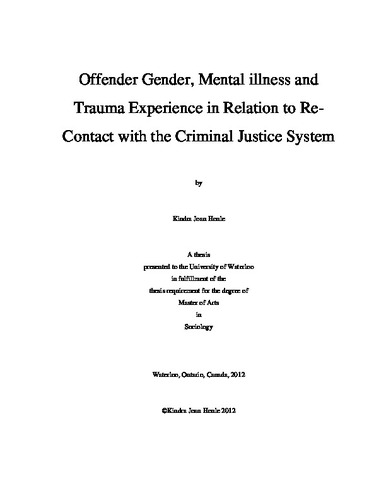| dc.description.abstract | Female offenders’ experiences within the criminal justice system and the way in which they become involved with the criminal justice system are very different than that of male offenders. Previous research that has been conducted on female offending does show that womens’ contact with the criminal justice system can often be related to histories of abuse and to mental illness, and that these can also be related to subsequent re-contacts with the criminal justice system.
Abuse, mental illness and gender, along with control variables (age, aboriginal identity, LSI-OR score), were investigated in a sample of 522 male and female Ontario Provincial offenders. When males and females were compared at the bivariate level using a chi-square comparison, females were found to be significantly more likely to re-contact. Abuse and mental illness were not found on their own to be significantly related to re-contact, but when the relationship between the three variables was examined, mental illness was found to be both significant and positively correlated to both gender and abuse. Examination into the relationship between the variables found a strong relationship between gender and abuse, gender and mental illness, mental illness and abuse as well as strong relationship in the three way interaction between gender, mental illness and abuse. The cross tabulation demonstrated that women who had experienced abuse were identified as being much more likely to be suffering from a mental illness.
Logistic regression was used to model the relationship between re-contact, gender, abuse and the risk for re-contact. All possible interactions (as noted above) were included in the model, but the model that best fit the data included only the controls (age, aboriginal identity, LSI-OR score), gender, abuse, mental illness and the interaction between mental illness and gender. Results indicated that there was a significantly higherrisk for re-contact for females with mental illness, compared with men with mental illness or or to men and women without mental illness.. Even though abuse as a single variable or as part of an interaction was not found to be significantly related to re-contact, it is still of importance to note that the chi-square comparisons demonstrated that abuse is significantly related to gender and mental illness, therefore the relationship was still important when looking at the implications of the research.
It is recommended that future research further investigate the different needs of male and female offenders and the role that experienced physical, sexual and emotional abuse, mental illness and gender plays in not only offending behaviour, but in the treatment and rehabilitation of offenders within the provincial correctional system. | en |

